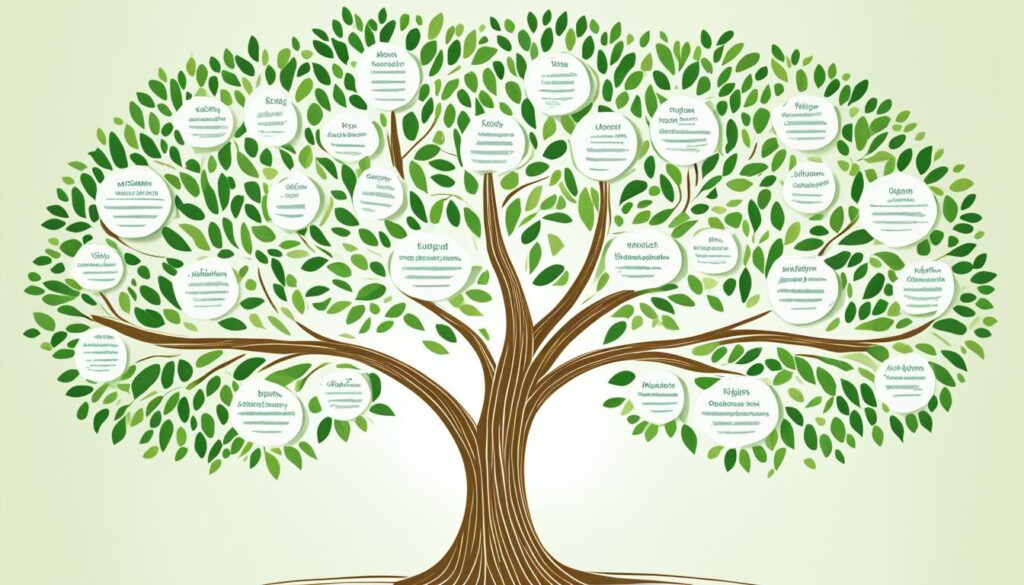Budgeting is essential for managing your money well. In this article, you’ll get 15 easy tips for budget beginners. You’ll learn to set up a budget, keep an eye on spending, save wisely, and pay off debt.
This will guide those new to budgeting or wanting better skills. Follow these tips for a strong financial future.

Key Takeaways:
- Beginners should focus on creating a budget, tracking expenses, and prioritizing savings and debt repayment.
- Budgeting to zero ensures every dollar has a purpose and prevents accidental spending.
- Collaborate with your partner or accountability partner to align financial goals and make joint decisions.
- Prepare for variations in monthly expenses by reviewing your calendar and including specific expenses in the budget.
- Make debt repayment a priority to free up more money for savings and other financial goals.
Budget to zero before the month begins
Budgeting to zero before the month starts is key. It means every dollar you make has a purpose. You’ll have a plan for your money and avoid any waste. This way, you’re completely in charge of your finances, making choices that help you reach your goals.
With this method, you put your income into categories like bills, groceries, and fun. There’s no guesswork. It lets you manage your money better and make smart decisions about spending and saving.
Creating a Zero-based Budget
To create a zero-based budget:
- Determine your income: Start by figuring out your total monthly income from all sources, like work or side jobs.
- Identify your expenses: List all your expenses, including regular bills, changing costs, and savings goals.
- Assign every dollar a purpose: Spread your income across different expenses, ensuring each dollar has a job. Your income minus expenses should be zero.
- Track your spending: Keep an eye on your expenses and compare them with your budget. This helps you spot where to adjust or save more.
A zero-based budget gives you a clear plan for your money. It helps you stick to your budget, aim for your financial dreams, and make choices that match your values.
Getting it right might take some tries. Be ready to tweak things as needed. Soon, budgeting to zero will feel easy and lead you to financial security and liberty.
Create a budget together
If you’re married or have a partner in money matters, making a budget together is key. This joint effort not only brings you closer but also improves how you handle your finances. Working as a team, you can set common money goals and be sure you’re both managing money well.
Talking about finances regularly can be very helpful. It’s your chance to support each other, share responsibilities, and make money decisions together. Being open and trusting with each other about money helps you both reach your goals.
Here are some steps to consider when budgeting together:
- Identify your financial goals: Start by setting clear financial goals, both short and long term. Whether it’s saving for something big, getting out of debt, or preparing for retirement, having shared goals makes your budget more effective.
- Evaluate your income and expenses: Look closely at what you both earn and spend. Know where your money comes from and where it goes each month. This full review lets you manage your money better and decide where to save or spend more wisely.
- Discuss your spending priorities: It’s crucial to talk about and agree on what’s most important to spend on. Separate needs from wants to figure out how best to use your budget. This helps you avoid unnecessary spending and keep your finances strong.
- Assign roles and responsibilities: Share the budgeting tasks between you. This could mean keeping track of spending, checking financial statements, or keeping records. By dividing up the work, both partners contribute and share in managing the budget.
- Establish regular budget meetings: Have set times to look over your budget, discuss any financial changes, and adjust your plans. These meetings are a chance to celebrate successes, tackle problems, and make decisions together to better your financial health.
- Provide encouragement and support: Budgeting can sometimes be hard, so supporting each other is vital. Share helpful resources, tips, and success stories to keep motivated and committed to your budgeting plans.
By making a budget together, you use each other’s strengths to face financial challenges as a team. Working closely helps you reach your financial targets faster and builds a strong financial foundation for the future.
“In budgeting, unity is strength, and collaboration is key. By creating a budget together, couples and financial partners can align their goals, foster transparency, and strengthen their financial future.”

Sample Monthly Budget Allocation
| Expense Category | Allocated Amount |
|---|---|
| Housing (Rent/Mortgage, Utilities) | $1,200 |
| Transportation (Car Payment, Gas, Insurance) | $400 |
| Groceries and Dining Out | $300 |
| Healthcare (Insurance, Medications) | $200 |
| Debt Repayment | $500 |
| Savings and Investments | $300 |
| Entertainment and Recreation | $200 |
| Personal Care | $100 |
| Charitable Contributions | $100 |
| Miscellaneous | $200 |
| Total Income | $3,500 |
This table is just an example to show how you might organize a monthly budget. The actual amounts will depend on your own financial situation and goals.
Prepare for different expenses each month
When learning to budget, it’s important to know that every month is different. Some months, you have usual costs like rent and groceries. Other months, you might need money for birthdays or vacations.
To handle your budget well, get ready for these changes. Looking at your calendar can help you spot future expenses. Knowing what’s ahead helps you avoid financial surprises.
For instance, if a friend’s birthday is soon, set aside money for a gift. This way, you won’t have to rush or spend too much at the last minute.
It’s also smart to have a “miscellaneous” budget each month. This reserves money for surprises. Having this safety net keeps you ready for anything unexpected.
Example:
| Month | Routine Expenses | One-Time Expenses |
|---|---|---|
| January | Rent Utilities Groceries |
|
| February | Rent Utilities Groceries |
Friend’s Birthday Gift ($50) |
| March | Rent Utilities Groceries |
|
| April | Rent Utilities Groceries |
Family Vacation ($500) |
Here, you can see the budget changes over different months. Planning for future costs helps create a realistic budget. Then, you can adjust your spending as needed.

Prioritize debt repayment
If you have debt from credit cards, student loans, or other areas, it’s crucial to focus on repaying it. Making debt repayment a key part of your budget helps you take charge of your money. It sets you on the path to becoming debt-free.
The debt snowball method is a good strategy to consider. Start by paying off your smallest debts first while paying the minimum on others. When a debt is cleared, use that money for the next smallest one. This method brings a sense of achievement as you watch debts disappear one by one.
Another tactic is the 7 Baby Steps by Dave Ramsey. These steps guide you from getting out of debt to building wealth. The first step is to save $1,000 for emergencies. The next steps include clearing all debt and saving for the future.
By focusing on repaying debt, you eventually free up money for things like an emergency fund, a house down payment, or investments. Also, getting rid of debt can boost your credit score. This improves your chances for future loans if necessary.
“Getting out of debt is hard but doable. It takes discipline, sacrifice, and changing your money habits. By making debt repayment a priority, you take a big step towards financial freedom.”
Create a debt repayment plan
To tackle debt efficiently, you need a plan. Begin by listing all your debts including amounts owed, interest rates, and minimum payments. This gives you a clear picture of what you owe.
Then, pick the best repayment strategy for you, like the debt snowball method or the 7 Baby Steps. Choose one that matches your goals and keeps you motivated.
Try to make larger payments on your debts when you can. Use extra funds like bonuses, tax refunds, or side hustle earnings for debt repayment. This speeds up the process and helps clear your debts quicker.
Keep track of your progress and celebrate your successes. Seeing your debts shrink is rewarding and keeps you motivated. Use apps or spreadsheets to monitor your journey towards being debt-free.
| Benefits of Prioritizing Debt Repayment | Steps to Prioritize Debt Repayment |
|---|---|
|
|
Remember, tackling debt takes discipline and hard work. It’s not always easy, but dedicating part of your budget to repaying debt leads to steady financial improvement.

Trim your budget when necessary
Sometimes, you may need to cut your spending to save. This is important if money is tight. Think about spending less on things like eating out or movies. Look for cheaper options, like discount stores or fewer streaming services. Remember, you can always change your budget later.
To cut costs, focus on big-impact areas. Small steps can lead to big savings. Here are some simple tips:
- Cook at home rather than dining out. It saves money and lets you control what you eat.
- Cancel unused subscriptions. Look at what you really use, like streaming or gym memberships, and cut what’s not needed.
- Go for generic brands when grocery shopping. They’re often as good as name brands but cheaper.
- Look out for sales and discounts. Plan buying around sales and use coupons when you can.
Trimming your budget doesn’t mean you must give up everything. It’s about smart choices, balancing money goals with your lifestyle.
With small, mindful changes, you can make your budget stretch. This helps reach your financial goals.
| Options for saving money | Estimated savings per month |
|---|---|
| Cooking at home rather than dining out | $150 |
| Cancelling unused subscriptions | $50 |
| Choosing generic brands | $30 |
| Using sales and discounts | $50 |
Small changes can lead to a big difference. Saving $10 a day adds up to $300 a month. This extra money can help with debts, a vacation, or an emergency fund.

Set up auto drafts for bill payments
Paying bills can be time-consuming and stressful. To make it easier, think about setting up automatic drafts. This means you automatically pay bills like rent and utilities from your bank account. It ensures you never miss a payment.
When starting auto drafts, watch your bank balance closely. Make sure you have enough money for the payments. Align your auto drafts with when you get paid to avoid overdraft fees. Check your bank statements often and adjust your payments if needed.
Using auto drafts means your bills get paid without you having to remember. This gives you peace of mind and lets you focus on other things.

Automated payments help you worry less about bills and more about saving money. It’s a great tool for managing your budget and making sure you’re never late on a payment.
Establish and track your financial goals
Setting financial goals is key when you start budgeting. It’s important for everyone, whether you’re paying off debt or saving for the future. Having clear goals gives you direction and keeps you motivated. By knowing what you want to achieve, you can make better money choices.
Financial planning for beginners might seem tough. But, breaking it down into clear goals can simplify it. Write your goals down and keep them where you can see them. This way, you’ll always remember what you’re aiming for.
It’s vital to track your progress towards your goals. Check on your goals regularly to see how you’re doing. If needed, adjust your budget to stay on the right path. And don’t forget to celebrate every win, big or small. Celebrating helps you see the value in your journey.
Budgeting for beginners helps you draw a map to your financial success. By setting and keeping an eye on your goals, you get clear about your plans. This clarity helps you make smarter decisions with your money.

Keep a miscellaneous category in your budget
When budgeting, always plan for the unexpected. Include a miscellaneous category in your budget. This lets you deal with unplanned expenses throughout the month.
Each month, set aside a little money for these expenses. This approach safeguards your budget from unexpected costs. It prevents the need to use funds meant for other needs.
If you find you’re often placing certain costs in the miscellaneous slot, think about making a specific budget line for them. Tracking and managing these expenses becomes easier this way.
| Budget Category | Allocated Amount | Actual Amount |
|---|---|---|
| Utilities | **$200** | **$180** |
| Groceries | **$300** | **$320** |
| Transportation | **$100** | **$100** |
| Miscellaneous | **$50** | **$60** |
Why is a miscellaneous category important in budgeting?
A miscellaneous category in your budget adds flexibility. It prepares you for any sudden expenses. With it, there’s no need to shuffle funds or use credit cards in a panic.
Having a miscellaneous category ensures you’re ready for unexpected costs. Whether it’s an urgent car fix or a medical bill, you’re covered. It keeps your budget on track without stress.
Always check and adjust your miscellaneous funds as needed. Keeping an eye on spending and unexpected costs helps a lot. This way, you ensure you’re always ready for financial surprises.
Adding a miscellaneous category is a smart move. It shows you’re ready for whatever comes your way financially. You keep control of your finances and your budget stays intact.

Avoid using credit cards and focus on cash
For those new to budgeting, a key tip is to use cash over credit cards. Credit cards might seem handy but can lead to quick, unplanned buys. They also make tracking your spending harder. Switching to cash or debit cards means you can physically see your money. This helps prevent overspending.
Cash makes you feel more connected to your money. You notice when money leaves your wallet. This builds a sense of responsibility. You become more aware of your purchases. This awareness helps you stick to your budget and buy wisely.
Sticking to cash or debit saves you from interest fees and the debt that can come with credit cards. It keeps you in charge of your budget. It stops you from piling up unnecessary debt.
Credit cards come with perks like rewards or protection for your buys. But, they can tempt you into spending too much and gathering debt. To steer clear of this, try leaving your credit cards at home. Or, freeze them in ice to curb spur-of-the-moment spending.
Benefits of Using Cash for Budgeting
Cash payments have several plus points that help you keep to your budget:
- Tangible representation of spending: Cash lets you see and feel your money. This makes it simpler to watch and limit your spending.
- Avoidance of interest charges: Choosing cash means no interest charges from credit cards. This saves you money over time.
- Increased financial control: With cash, you can only spend what you have. This gives you better control over your budget.
- Prevention of overspending: Cash makes you think before buying. This can help you avoid unnecessary or quick purchases.
Using cash and debit cards boosts your budgeting work. It leads to a more precise and controlled way to manage your finances.
| Using Credit Cards | Using Cash |
|---|---|
| Can lead to impulsive spending | Encourages mindful purchasing decisions |
| May incur interest charges | Avoidance of interest charges |
| Harder to track expenses | Easy tracking of expenses |
| Potential for accumulating debt | Prevention of unnecessary debt |
Remember, if you’re new to budgeting, the goal is to develop good financial habits. Choosing to spend with cash is a big move towards your financial goals. It lays a strong base for long-term financial well-being.

Now, let’s look at how online budgeting tools can improve your approach to budgeting.
Utilize online budgeting tools
If pen and paper aren’t your thing, try online budgeting tools. These tools help plan and track your budget, even with partners. They make it easy to keep an eye on your finances. EveryDollar, Mint, and YNAB are some top picks.
These tools have features that simplify money management. With them, you can:
- Create a digital budget that does the math for you
- Understand your spending better by categorizing expenses
- Set and keep an eye on financial goals
- Get reminders for when bills are due
- See your finance numbers in charts and reports
Using these tools can make budgeting smooth and give you useful financial insights. They are great for both budgeting newcomers and pros. The interfaces are easy to use, and the tools are packed with helpful features.
Benefits of Online Budgeting Tools
Online budgeting tools are packed with benefits:
- Convenience: Manage your money anywhere you have internet.
- Automation: They can automatically update with your bank and credit card info, making things easier.
- Collaboration: It’s simple to share your budget and work with others, like your partner.
- Security: Good budgeting tools keep your data safe with encryption and other safety measures.
“Online budgeting tools make budget management easy, offering convenience, automation, collaboration, and security.”
Before picking a tool, research and compare different ones. Look at how easy they are to use, their features, cost, and what others say about them. The right tool can help you get a handle on your money and reach your goals.

Practice contentment and avoid comparison
Having a mindset of contentment is key when budgeting. Comparing your finances to others can lead to unhappiness. It can even hurt your financial choices.
Focus on your own financial goals and values. Everyone’s financial journey is unique. What works for others might not work for you. Stay true to your aspirations and make choices that reflect your financial priorities. It’s okay to take time to learn and adapt.
Don’t let comparisons make you feel less. Resist the urge to match others’ lifestyles. Value your own progress and the goals you achieve. Enjoy the fulfillment that comes from following your own financial path.
Budgeting is about personal growth and self-awareness. Be happy with what you have and aim for financial improvement. By valuing contentment over comparison, you’ll foster a mindset that supports smart financial decisions.